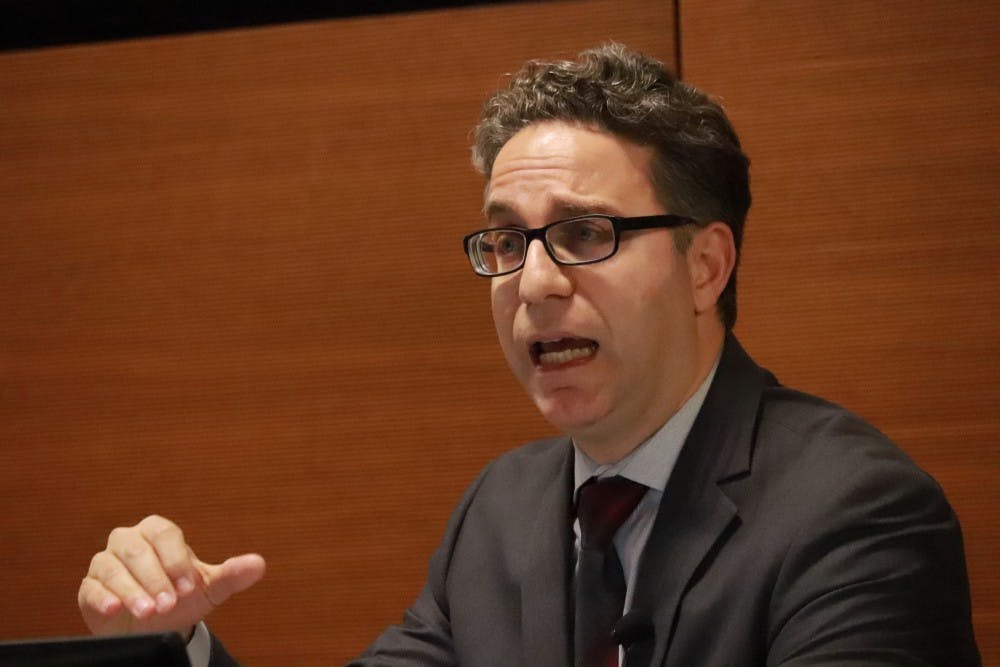Jamil Dakwar, director of the American Civil Liberties Union human rights program, spoke at IU on Wednesday about the inequalities Palestinian citizens face in Israel.
“There’s a total denial of the injustice against Palestinians,” Dakwar said.
IU Student Government President Alex Wisniewski vetoed a resolution Thursday that would have condemned Dakwar's speech because of his past support of the Boycott, Divestment and Sanctions movement.
"I do not believe it is in the purpose of IU Student Government to condemn academic discussions that promote free speech, encourage the voice of underrepresented students and allow for opportunities to learn about a different world view," Wisniewski said in an email to the Indiana Daily Student.
The BDS movement calls for boycotts, divestment and sanctions against Israeli businesses, cultural institutions and universities, according to the Associated Press.
The resolution cited the Anti-Defamation league which says the BDS movement denies Jewish people's right to self-determination and that many individuals involved in BDS campaigns oppose Israel's existence as a Jewish state.
Rachel Aranyi, a member of the Indiana Israeli Public Affairs Committee at IU and a sponsor of the resolution, said the bill passed IUSG congress, but as of Wednesday night IUSG was waiting on the president to sign it or veto it.
"There's nothing wrong with legitimate critiques of any government," Aranyi said. "But when it crosses the line into discrimination that targets a specific group and denies rights of a people to have self-determination that's when there's issues."
Although Dakwar is a director of the ACLU, he began his lecture by stating that his remarks were a representation of his own beliefs and not those of the ACLU.
“I’d like to talk more in a personal capacity,” Dakwar said.
Dakwar said he has been a human rights advocate since he was in high school and, as a Palestinian citizen of Israel himself, he finds this topic to be near to his heart.
In the lecture, Dakwar told the audience of his most recent trip to Israel as part of a delegation to explore the mistreatment of Palestinians.
There is a long history of conflict between the Israelis and Palestinians in Israel, but Dakwar said he believes this is the worst he has ever seen it.
“It’s never been worse than what is going on now, because there is a sense that there’s no kind of accountability whatsoever for the Israeli government,” Dakwar said.
Dakwar said in Israel, Palestinians are treated as second class citizens.
In most Palestinian neighborhoods, Dakwar said the residents are no longer being given building permits in an effort to decrease the number of Palestinians in Israel.
Dakwar said there are 35 unrecognized Palestinian villages in Israel with a total population of about 100,000 people who live with no access to water, electric services and education.
Surrounding those villages are Jewish towns that are given full services and the ability to live in dignity, he said.
Although the direct effect of the mistreatment of Palestinians is being felt in the Middle East, Dakwar said this is still an important topic to discuss in the U.S.
“There are conversations that need to be had here in the United States because the United States is the largest financial supporter of Israel,” he said.
Dakwar said there is also a mindset regarding Palestinian activism in the United States that needs to change.
“If you are advocating for Palestinian rights, you are inherently anti-Semitic, and we should reject that,” Dakwar said. “I should not be labeled anti-Semitic just because I am defending my right to exist.”
Jordana Ichilov, president of the Indiana Israeli Public Affairs Committee at IU, said because Dakwar was separating himself from the ACLU for this lecture, she was worried he might conduct a more one-sided talk on behalf of the Palestinians.
“I’m here to make sure that nothing anti-Semitic comes about in this discussion,” Ichilov said. “To make sure that nothing delegitimizing or dehumanizing or showing double standards gets brought up.”
Aranyi said she felt this was an incorrect format to discuss this topic, because it is too complex to be limited to a lecture setting.
“The idea that you can articulate the complexity and the nuance that this topic deserves in this manner is truly absurd,” Aranyi said.
Jackson Treadway, a senior at IU, said he felt the lecture was enlightening. He said due to the lack of the media coverage in the U.S., he wasn't aware of the level of inequalities Palestinians face in Israel.
“Sometimes it can be overshadowed by what’s going on domestically,” Treadway said, “So when you do come to a talk like this you realize there are some serious issues going on.”




